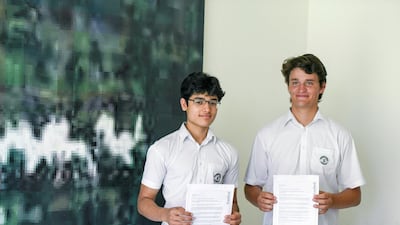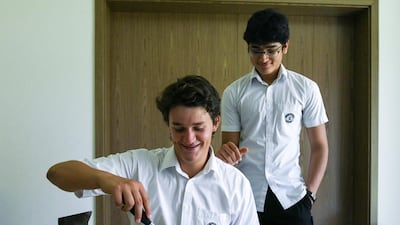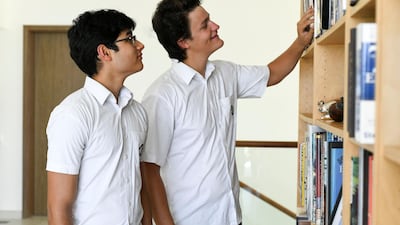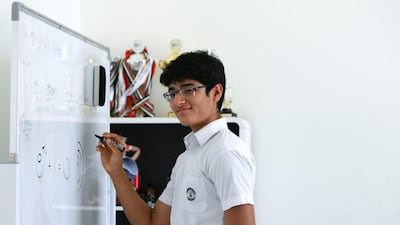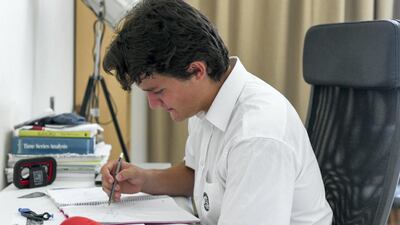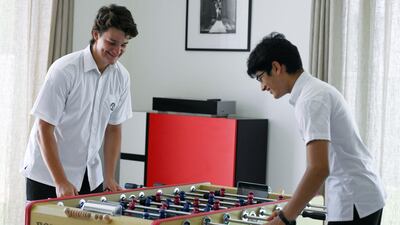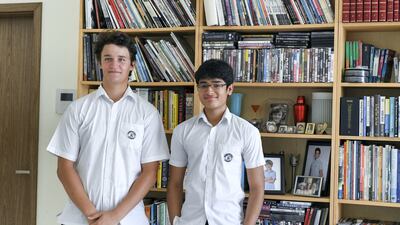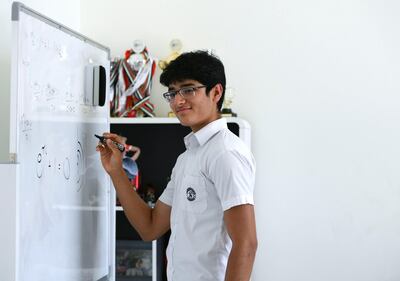Two school friends in Abu Dhabi made their dream a reality when both were accepted to study at Stanford University.
They spent their last few years at secondary school talking about places at a top-ranked college, and now they are going to the world's No 2.
Solal Afota and Vedant Khanna, 18, who are in their final year at British School Al Khubairat in Abu Dhabi, turned down some of the world's best campuses, including the University of Cambridge in the UK, to study in the US.
They are the first two pupils from the school to go on to study at Stanford, which is second in the Times Higher Education World University Rankings.
"I applied to universities in the US, Canada and the UK and even got accepted in Cambridge's Trinity College to study mathematics," Solal told The National.
“My dream was always to go to the University of Cambridge and I never really thought about studying in the US, but when I got accepted to Stanford in December I just jumped around my room.
“I think it was about 4am UAE time when I could access the online portal to find out if I had been successful. When I clicked it, all this confetti flooded the screen, that was obviously a good sign.”
With an acceptance rate of less than 5 per cent, Stanford is more selective than the US's eight Ivy League schools, including Harvard, Princeton, Yale and Columbia.
Each year, the school accepts about 200 international students as undergraduates.
After months of deliberation, Solal, who moved to the UAE when he was 10, said he made the decision to accept the place at Stanford and is likely to study mathematics and computer science there.

A keen mathematician, the French pupil ranked eighth globally in the British Mathematical Olympiad final this year.
He is also part of the French Olympiad maths team, where he is ranked fourth nationally.
Besides Cambridge and Stanford University, Solal was also accepted at the University of California Berkeley, the University of Toronto and the University of Waterloo, both in Canada, where he was offered a merit-based scholarship.
"I think a lot of my family and friends were surprised I chose Stanford over Trinity, as that was always my dream university,“ he said.
"It just makes more sense to go to the US as I want to get into tech start-ups in the future.
"I guess the end goal is to be the founder of the next-generation Google or Amazon, so I have my sights set on Silicon Valley.“
For Indian pupil Vedant, Stanford was always the dream, but it was a goal he did not think was possible.
“I was always so confident Solal would get in, he has his life plan set out, but when it came to me, I wasn’t confident,” Vedant said.
“When I saw 'congratulations' written across the screen, I fell silent and just paced up and down my room.
“My mum was with me and her screams made up for my lack of words at the time.”
Described as one the "best physicists I have ever had the privilege to teach", by his head of year, Michael Byrne, Vedant plans to study physics and computer science when he moves to the US in September.
Vedant said he is still pinching himself.
Both pupils will have to fund their accommodation and tuition fees, totalling about $80,000 (Dh290,000) a year, so they are keen to find sponsorship in the UAE in exchange for a work placement or internship.
“Personally, right now, I have no clue what I want to do in the future but I guess, and not to sound cliched, I’d want to give something back to the world,” Vedant said.
“Maybe use AI, which is something I’m so passionate about, or some other advanced tech to impact the world positively.”
For their application process, both boys had to submit eight short-form essays that gave the application panel a glimpse into their “vulnerabilities and personality”.
Mr Byrne, head of Year 13 at BSAK, said both boys were outstanding pupils.
“I have had the privilege of teaching Solal and Vedant for A-Level physics, as well as working with them as part of the Sixth Form pastoral team,” he said.
“Solal is one of, if not the best, mathematicians to have ever graced BSAK, and Vedant’s ability and reading already extends well beyond the demands of an A-Level syllabus in physics and computer science."
